Government under fire as incompetent virus response risks economic disaster
Also in this edition: Mounting concerns about hunger striking activists, and a respected academic faces being thrown out of Thailand
Welcome to the weekly Secret Siam news roundup. If you haven’t subscribed, please do. Paid subscriptions really help support my journalism and fund more Thai translations of my work. If you prefer not to pay, you can still sign up for free editions.
To everybody who has already subscribed, thank you very much! Now onto the week’s news…
Anger growing at regime over virus debacle
Facing record daily infections after an outbreak of the particularly virulent “British variant” B.1.1.7 that began in high-end Bangkok nightclubs was spread around the kingdom by people going to their hometowns for Songkran, prime minister Prayut Chan-ocha gave a televised speech last Friday to set out the government’s response.
It was a disaster. He waffled, made excuses, and criticised protesters demanding democracy even though they had no role in the latest surge of infections — unlike government officials including a minister who caught the coronavirus at high-end hostess clubs operating illegally without proper licenses. Only after 20 minutes of grumbling and deflecting blame did he finally get onto the substance of his speech — what the government was planning to do to tackle the latest wave of infections — after one of his advisers held up a sign to remind him to talk about it.
So what was the government’s plan? As it turned out, there was hardly a plan at all. There would be no nationwide lockdown and no curfew. A few ineffectual measures were announced — for the next two weeks, shopping malls have to close at 9 pm, 24-hour convenience stores have to shut between 11 pm and 4 am, and restaurants are not allowed to sell alcohol. But gyms, restaurants and markets can still stay open for most of the day.
Prayut said he couldn’t order more decisive measures because that would do too much damage to the already battered economy:
My heart aches every time we need to roll out these measures. I feel a heavy heart and uncomfortable because I know that these measures will affect someone to some extent, particularly low-income earners.
A lesson from the pandemic in countries all over the world is that when faced with an outbreak that is spreading exponentially, firm and decisive action is required as quickly as possible to get the situation under control. Any delay in implementing strict measures just means the virus keeps spreading and in the end an even harsher lockdown usually has to be imposed.
Even the usually supportive Thai PBS was critical of Prayut’s dismal performance. They quoted Yuthaporn Issarachai, a political scientist at Sukhothai Thammathirat Open University:
Prayut has failed to pass the test of effective communication during a crisis. His comments had nothing to do with what the public wants to hear in a crisis. They want to know what the government will do to tackle the latest outbreak, instead of wasting their time listening to him blaming others.
Titipol Phakdeewanich, dean of Ubon Ratchathani University’s political science faculty, was equally scathing:
He has never really delivered any key messages or unveiled strong, clear, constructive policies. His latest speech had no substance as usual and was only used to blame others. Claiming that all critics have a political agenda will not solve the problem. It is a bad mindset to not accept any scrutiny or questions raised against the government
In a reaction on Thai Enquirer, journalist Cod Satrusayang wrote:
One of the expectations when you have military men running the country is that at least they would be decisive…
Even now with multiple hotspots breaking out throughout the country and record numbers of Covid-19 cases being counted every day, the generals continue to choose the most milquetoast, lukewarm option given to them.
Experts have agreed that these limited restrictions (that were introduced too late) will not sufficiently bring down the new number of cases (if at all).
For a government that came into power promising decisive change and the need of military precision in guiding the country forward, the cowardice being shown by the cabinet speaks volumes about the quality of the men making the decisions.
With no coherent measures in place, the virus has been spreading fast. The number of new reported infections climbed to 1,767 on Sunday, a record in Thailand since the start of the pandemic. It dipped to 1,390 today but the overall trend has been heading sharply upwards for days and the actual number of cases is likely to be much higher. The death toll has reached 104.
With field hospitals at risk of becoming overwhelmed — Thai policy is that everybody who tests positive has to be quarantined in one of these facilities rather than isolating at home — the authorities have begun using cardboard beds, a clear sign of desperation. Royal conglomerate Siam Cement Group has been trying to win some positive public relations by promoting its donation of more than 4,000 of these makeshift bed kits. Even Bangkok Arena has been converted into a field hospital as the crisis worsens.
As I have been reporting for months, Thailand’s shambolic vaccination strategy is an ongoing disaster for the image of the monarchy because it was designed to promote palace propaganda rather than just focusing on getting as many people inoculated as quickly as possible. The regime decided to rely almost entirely on a deal for royal company Siam Bioscience to produce millions of doses of the vaccine in Thailand, and failed to bother securing other sources apart from a few million doses of Sinovac. This was supposedly in line with “sufficiency economy” principles of self-reliance, but has left the country desperately short of doses, with no vaccine expected from Siam Bioscience until June at the earliest.
As Associated Press reported last week:
The latest crisis has made glaringly apparent an Achilles heel in Thailand’s strategy, a failure to secure enough doses this year to inoculate a targeted 70 percent of the population believed necessary to achieve herd immunity.
In his speech, Prayut claimed Thailand was trying to secure more doses from other suppliers:
We have contacted all vaccine manufacturers and are still in talks with them. But last year, it was only AstraZeneca that was willing to work with us.
But this isn’t true — Thailand had the chance to join the World Health Organisation’s COVAX scheme but declined, and also turned down an offer of vaccines from India, because the regime wanted Siam Bioscience to get all the credit. Health minister Anutin Charnvirakul repeatedly insisted the regime’s vaccine policy was optimal, declaring back in January:
Let me confirm that the purchase of 61 million AstraZeneca doses and 2 million Sinovac doses are the best choice for Thais and Thailand.
That strategy has now been reversed as Thailand plunges into a worsening third wave and the regime belatedly begins a scramble to procure more vaccines. Illustrating his lack of grasp of the details, Prayut wasn’t even able to pronounce the names of various vaccines the government hopes to buy.
The regime has also used cost as an excuse, saying the COVAX scheme and other vaccines were too expensive, but as the CARE think tank tweeted last week, just 10 percent of the military’s bloated annual budget would easily pay for all Thais to be inoculated.
With discontent and anger growing in Thailand, Siam Bioscience released a statement last Friday insisting that plans were on track to deliver the first doses to the government in June. As with previous statements, it was issued by banking heiress Nualphan “Madame Pang” Lamsam, who calls herself “honorary director of corporate communications”. She has no background in bioscience and no expertise in corporate communications, and her only qualification for the job seems to be that she is a close friend of Princess Sirivannavari.
It’s extraordinary that Siam Bioscience is trying to defend itself against accusations that it gained a hugely important vaccine contract due to royal connections by outsourcing its corporate communications to a high-society socialite who seems to have been given the job purely because of her royal connections. The Siam Bioscience website doesn’t even meet basic standards of competence, with its news page spelling the company name at least three different ways including Siam BioScience and Siambioscience.
As a result of the debacle, Thailand is among the worst performers in southeast Asia and the world in terms of the number of people who have received at least one dose of the vaccine, according to figures compiled by Our World in Data.
Progressive Movement chairman Thanathorn Juangroongruangkit has suggested four changes to government policy to salvage the situation, but the regime seems unwilling to listen. Thanathorn is already facing lèse majesté charges for criticising the government’s vaccine strategy earlier this year.
Meanwhile, education minister Treenuch Thienthong says the new school term may now have to be postponed.
The regime’s reluctance to risk further damaging its popularity by imposing decisive lockdown measures means plans to reopen the kingdom to tourists later in the year are now in doubt, which will be a massive blow to the livelihoods of millions of people. Cod Satrusayang at Thai Enquirer quoted the views of a senior advisor to the Ministry of Public Health:
We don’t have a semblance of a vaccine plan, we do not have the willpower to impose measures that can curb this wave, so any talk of opening the country should be shelved indefinitely until we can get this under control.
Hotels, restaurants and small businesses all over the country are barely hanging on, and if there is no reopening in the second half of the year, many of them will go under.
As Ken Lohatepanont wrote in an editorial in Thai Enquirer:
The third wave of coronavirus threatens to undo all the government achieved over the past year. The fact that a minister immediately tested positive was a scandal, but for this battered government, imminently survivable. But both its public health and economic record going down the drain? That is a open question.
Instead of formulating an effective response to the latest outbreak, the regime has been focusing on damage limitation to cover up the embarrassing fact that transport minister Saksayam Chidchob was among several top officials to contract coronavirus after visits to super-expensive hostess bars in Thonglor. Saksayam has denied he visited a nightclub and blamed his subordinates for infecting him, and a timeline of his movements released by health authorities claims he was at home all day on April 2 and 3. But multiple sources say he visited Emerald Club and caught the virus there.
Several police officers in Thonglor — who tend to spend their time enjoying themselves in illegal hostess bars rather than doing their job — were infected too, and two senior cops in the precinct have now been transferred to inactive posts as punishment. This is another effort to hide the fact that everybody knew that huge nightclubs in the area were operating without licenses and were packed with high-rolling officials and businessmen night after night, with their parking lots full of luxury cars.
An unusually strongly worded editorial in The Bangkok Post attacked Prayut’s response and demanded a full investigation:
Instead of ordering a probe into a Covid-infected minister who was said to have visited one of the clubs — with all of their reckless violations of disease prevention measures — and who may potentially be a super-spreader, Prime Minister Prayut Chan-o-cha chose to protect his minister. He made a tongue-in-cheek comment, saying cabinet ministers shouldn't be naughty.
In a depressing illustration of the incoherence and incompetence of the regime’s efforts to tackle the virus, the government PR department issued photographs of soldiers in hazmat suits spraying disinfectant in the remote border area on the banks of the Salween river where thousands of Karen refugees had crossed into Thailand to flee airstrikes by the Myanmar military. The Thai authorities blocked most aid deliveries to them, refused to allow journalists access to the area, and sent the refugees back. Now the military is disinfecting the area.
There is zero evidence that coronavirus can be transmitted via contact with the ground or trees in ventilated outdoor areas, and spraying disinfectant is a pointless exercise. The whole charade illustrated the tendency of the army to promote itself with theatrical propaganda allegedly showing soldiers “defending” Thailand, and it also showed the military’s prejudice and paranoia towards refugees, which I wrote about earlier this month. The army regards refugees and minorities as unclean people whose presence contaminates Thai soil.
Fears grow for the health of hunger striking activists
Protest leader Parit “Penguin” Chiwarak was brought into Bangkok Criminal Court from prison this morning in a wheelchair for another hearing related to his lèse majesté and sedition charges. He has been on hunger strike for five weeks, and his mother told journalists that he has lost around 20 kg in weight and his hands are now very shaky. She is worried about his survival. Another protest leader, Panusaya “Rung” Sitthijirawattanakul has been on hunger strike for three weeks.
A screen was used to hide Penguin from view and prevent him being photographed as he arrived at the court. At the hearing, he repeated that he was boycotting the process and asked his lawyer to quit. His mother offered a 400,000 baht surety but Penguin was once again denied bail.
Hundreds of people, including the mothers of those imprisoned, have been staging daily “Just Standing” protests outside the Supreme Court, holding photographs of the detainees. They stand in silence for 112 minutes each day to symbolise their opposition to the lèse majesté law and the unfair treatment of those in jail who have been repeatedly denied bail. Similar protests have been held in Khon Kaen and outside the provincial court in Chiang Rai. The detainees themselves have withdrawn their cooperation with the legal process.
Mongkhon “Bas” Thirakot, a 27-year-old activist who travelled from Chiang Rai to join the Bangkok vigils went on hunger strike outside the Criminal Court at Ratchadapisek last Monday. On Wednesday he was arrested and taken to Chiang Rai to face a lèse majesté charge. He was held for two days and given bail on Friday.
Last week the mothers of Penguin and Rung appealed for people to write letters to them urging them to end their hunger strike, using the hashtag #เธอจะต้องมีชีวิตอยู่ — #YouMustLive. Among prominent supporters asking them to stop fasting were academics Prajak Kongkirati, who said “you must live to see and be the power of change”, and Somsak Jeamteerasakul, who told them “it’s getting dangerous now”.
But others have chosen to spend days without food in solidarity with the detainees, a campaign promoted with the hashtag #อดพร้อมเพื่อน — #FastWithFriends.
In a letter posted on Facebook, Rung thanked her supporters for their concern but appeared determined to continue her hunger strike:
The two of us fasting in protest isn’t only for ourselves, to say we want them to free us temporarily so we can do everything possible to fight this case, but it is also for every person being prosecuted for political reasons right now. There is no one who should be treated this way.
We thank you for and understand the concerns of each of you. Before this, we were afraid that everyone would forget us in here, and now it’s been 40 days. We were afraid people would forget that we were still on a hunger strike. But soon a campaign started up and we are happy — very happy that everyone hasn’t forgotten us.
But I ask each person right now, ourselves and everyone who sees message, tell people around the world why we are currently imprisoned and demand our release.
Penguin and Rung both seem determined to continue their protest, but if Penguin remains on hunger strike for a further week or more, his health will be in severe danger. It is very rare for anybody to survive more than 45 days on hunger strike.
Meanwhile, in further harassment by royalists of people they disagree with, the “Cheer Uncle” Prayut fan page on Facebook last week posted photographs of a young man being forced to prostrate in front of a portrait of the king. Royalist vigilantes alleged he had shared disrespectful comments on social media. Several similar events were reported back in 2016 in the immediate aftermath of the death of King Bhumibol, and it’s worrying to see it happening again.
Academic faces expulsion from Thailand
David Streckfuss, one of the leading international scholars focusing on Thailand and an expert on the lèse majesté law, has been fired by Khon Kaen University and had his work permit revoked, his wife Hathairat Phaholtap announced on social media last week.
Streckfuss has lived in Thailand for 35 years and worked for the university for 27 years. He is the author of the definitive work on lèse majesté, Truth on Trial in Thailand, and took part in a debate on Article 112 at the Foreign Correspondents Club last month. He also works with the The Isaan Record, an excellent source of news in the northeast that has been actively covering the democracy movement.
Hathairat, who is the Thai editor of The Isaan Record, said police had visited the university to say Streckfuss was “too political”.
Khon Kaen University unconvincingly denied any political motive for firing him, claiming “the termination was due to his failure to fulfill his duty regarding student exchange programmes”. The university did not explain how he was expected to organise a student exchange programme in the middle of a global pandemic.
Streckfuss is now trying to secure an alternative visa and said today he expects to have an answer by May 3.
A royalist campaign against another academic, prominent historian Nattapol Chaiching, is also continuing. Sulakshana Lamubol published an excellent article on the case in University World News last week.
Srirasmi sighted?
Photographs have been circulating on social media allegedly showing King Vajiralongkorn’s disgraced third wife Srirasmi Suwadee, at a restaurant in Hua Hin. Vajiralongkorn divorced Srirasmi, mother of Prince Dipangkorn, in November 2014 and jailed many of her relatives in a brutal purge. Since then, Srirasmi has been living under house arrest in Ratchaburi.
I can’t yet confirm if the images are genuine, but there have been rumours since last year that Srirasmi might be rehabilitated, due to the fact she is the mother of the heir apparent.
That’s all for this edition. Thank you for reading! 🙏


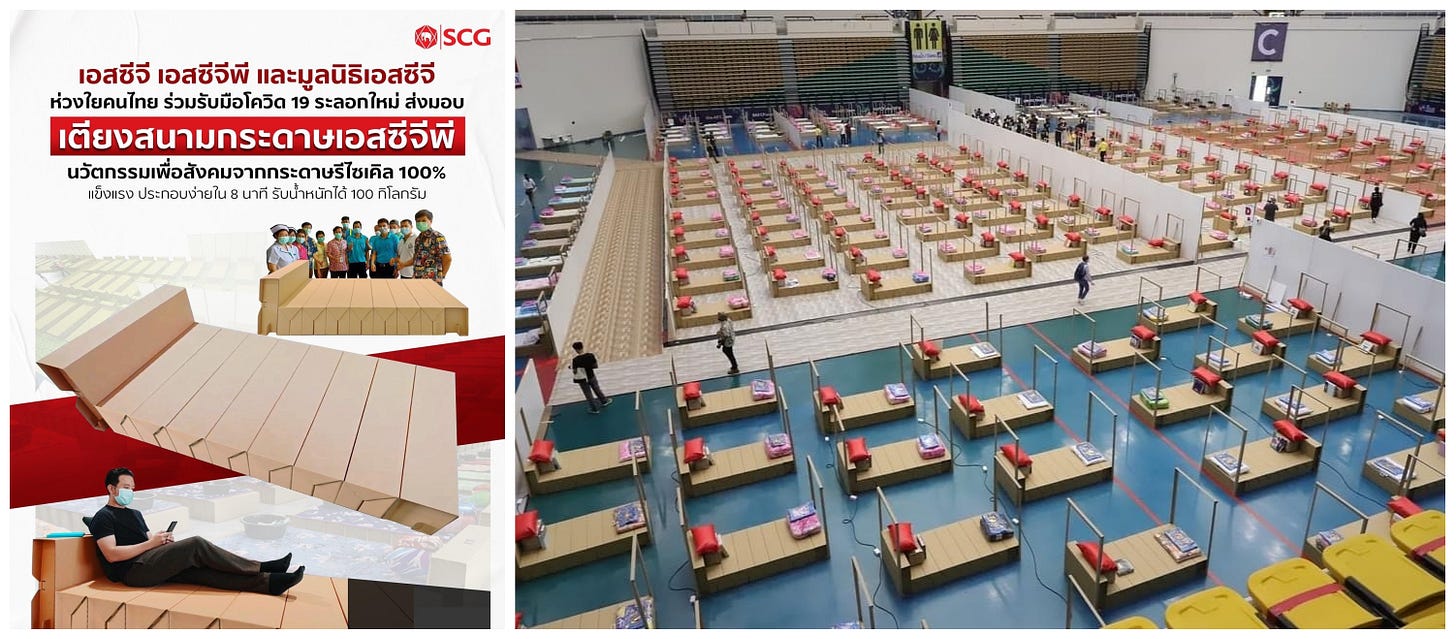
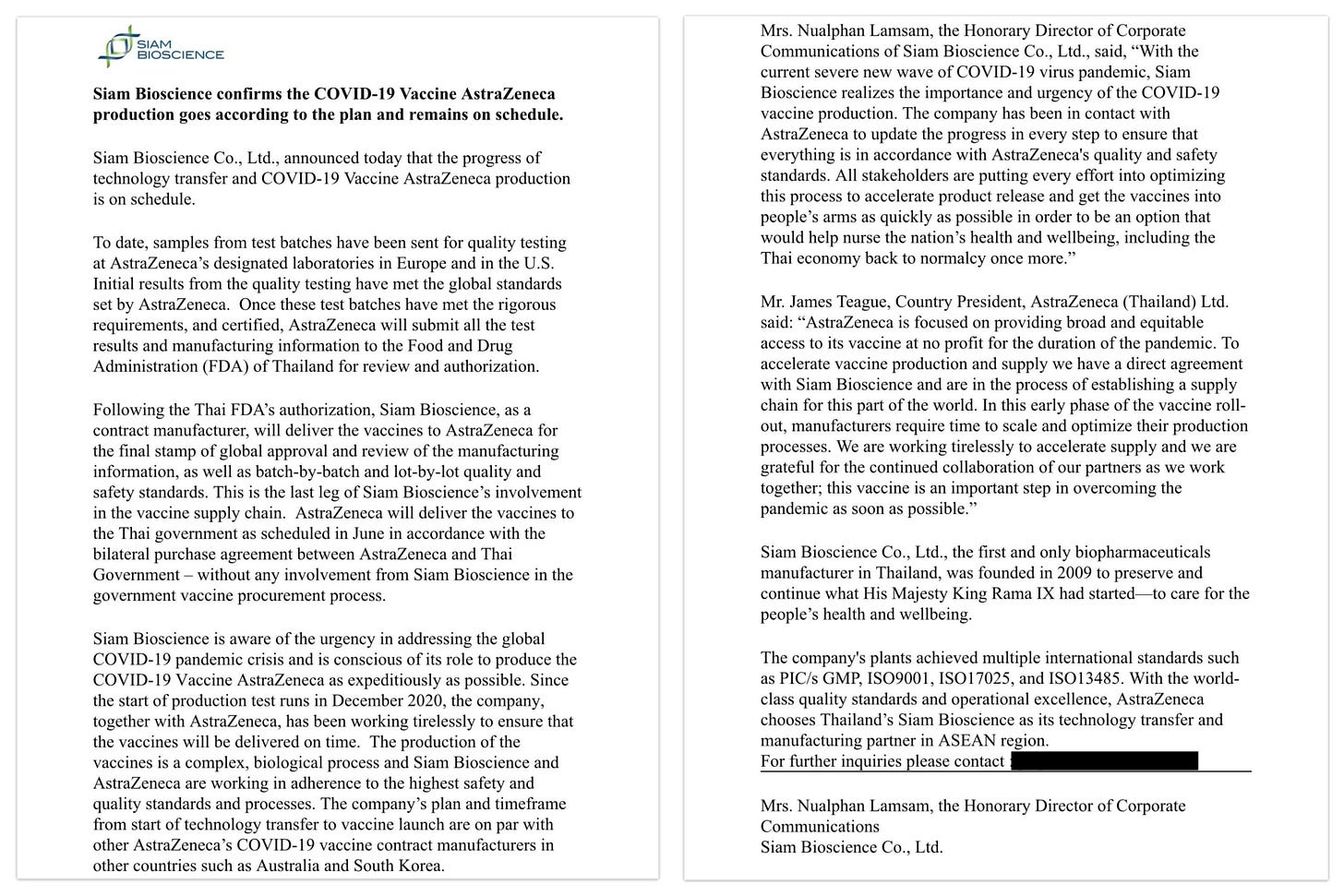
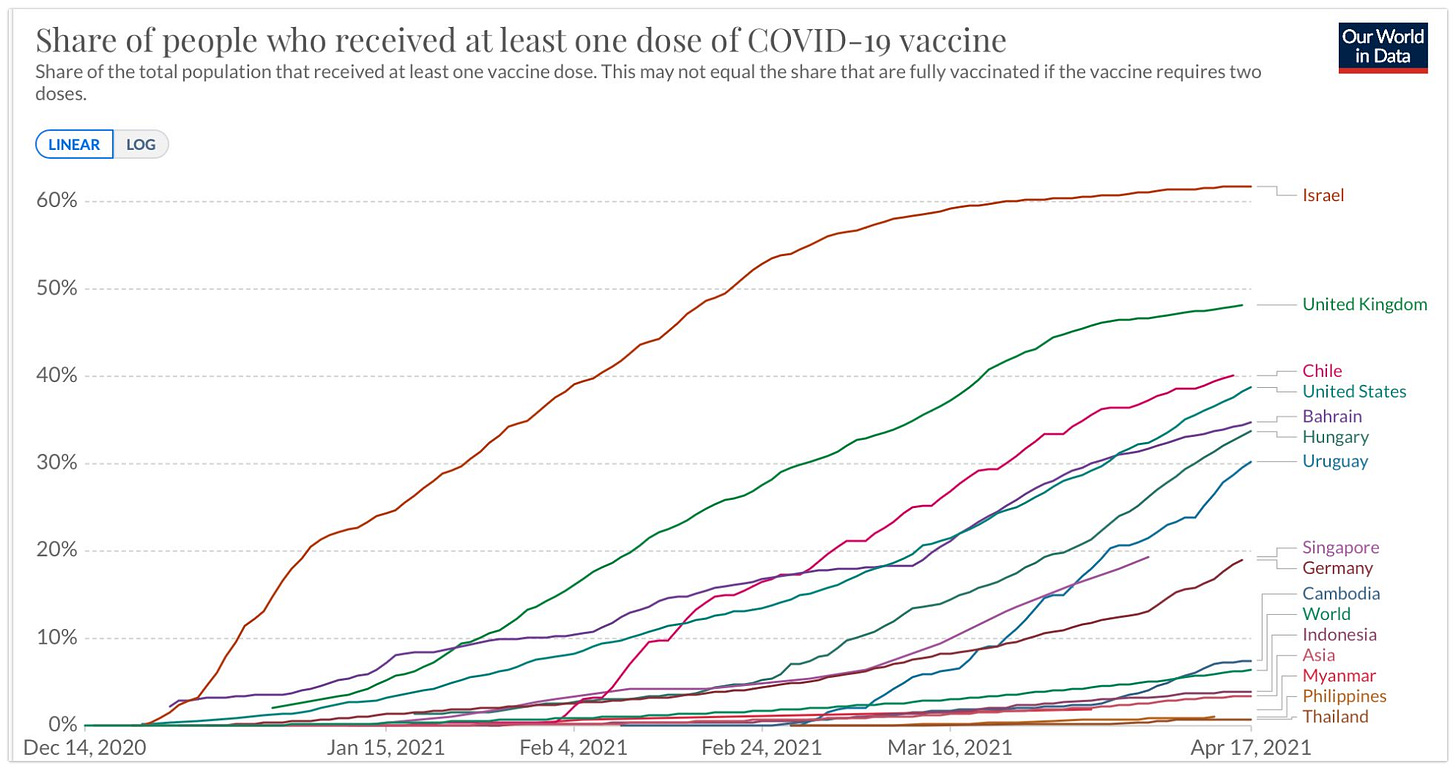


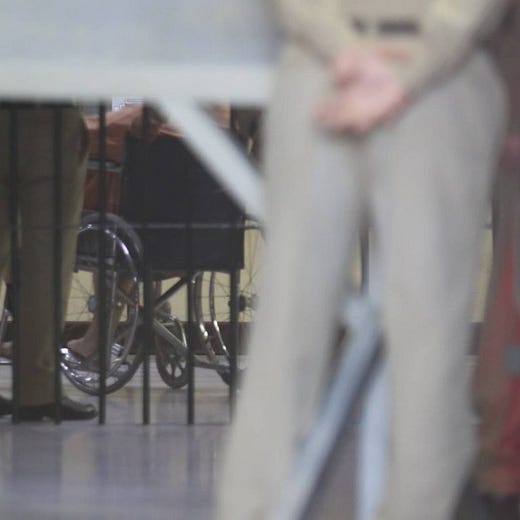
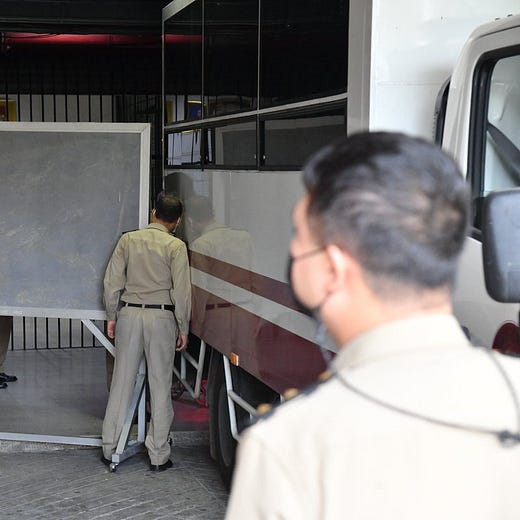


Personally, now I’m very worrying about Mr.Penguin and Mrs.Rung health conditions, It is very severe and hard fighting with death fasting strikes that I never seen it really before, even in the Hollywood movies. I’m very sure that now everyone especially his and her mothers still waiting outside the prison, their minds and hearts are nearly to break apart, everytime they’ve seen Penguin and Rung look more weaker by fasting...
I’m very respect his and her Bushido, The Willing to Fight until the death which similar to Japanese Samurai fight on the battlefield but, I don’t want to hear or see news that will report they are lose their breath on this fighting..if they actually lose their breath in this battle, who know how big the impact that will crash to the thailand judiciary system and the monarchy institution above..
My birth land country must be on inferno of anger and hated, by the people for the lost of thier lights and hopes...And that time “They” the rigime must be very regret that this gamble is eventually nothing but lose and a self suicidal game only happen... 😿❤️🌎👍
Yes, Mr.Andrew MacGregor Marshall, I would like to say Thank you very much for your interesting and insightful newsletter this week krub...😿❤️🌎👍